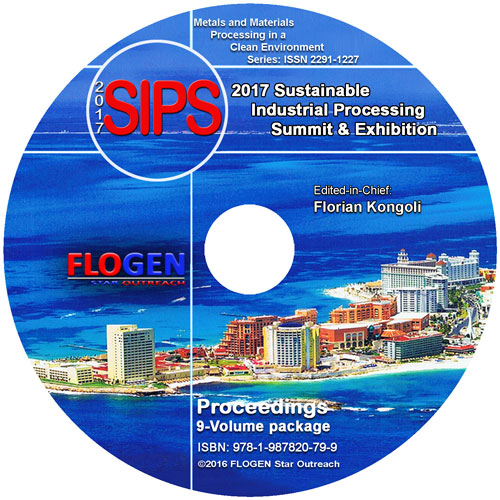2017-Sustainable Industrial Processing Summit
SIPS 2017 Volume 9. Iron and Steel, Metals and Alloys
| Editors: | Kongoli F, Conejo A, Gomez-Marroquin MC |
| Publisher: | Flogen Star OUTREACH |
| Publication Year: | 2017 |
| Pages: | 242 pages |
| ISBN: | 978-1-987820-77-5 |
| ISSN: | 2291-1227 (Metals and Materials Processing in a Clean Environment Series) |

CD shopping page
Prediction of Strength and Productivity of Sinter by using the Various Physicochemical Properties of Iron Ores
Young-Cheol Yang1;1POSCO, Pohang-si, Korea (Republic of [South] Korea);
Type of Paper: Regular
Id Paper: 53
Topic: 2
Abstract:
Raw materials of iron ore sinter are made up of a mixture of various iron ore brands. And, depending on the type of blend condition of iron ores, the qualities of sinter and operation result will vary. Therefore, every time we evaluate new iron ore or set up a suitable blend condition, a complex and difficult sintering simulation (pot test) should have been performed repeatedly for each case. To solve these difficulties, a quality prediction model of iron ore sinter is needed, using various properties of ores. The characteristics of iron ores were extensively analyzed in terms of chemistry, mineralogy, physical properties, reactivity, granulation properties and sintering performances. A database of these characteristics of iron ore brands was built up. Models to predict the strength, yield and productivity of sinter were developed based on the database and their applicability was checked through pot tests. The correlation coefficients between prediction models(SSI, Sinter Strength Index and SPI, Sinter Productivity Index) and sintering indices(TI, Tumbler Index and Productivity) from pot tests indicated 0.79 and 0.76, respectively. As a result, the models could be applied to the blending design of sinter mix according to the plant operation conditions reflecting physicochemical properties of iron ore brands.
Keywords:
Iron; Melting; Metallurgy; Modeling; Properties;References:
[1] K Sato, Fusen, 28 (1981), 99.[2] T. Haga, A. Oshio, D. Shibata, S. Kasama, T. Kozono and Y. Hida, Proceedings of 4th European Coke and Ironmaking Congress, ATS, Paris (2000), 118
[3] N.Nosaka, S. Ishozaki and K. Sugawara, Trans. ISIJ, 22, (1982), B77
[4] E.Kasai, S. Wu and Y. Omori, ISIJ Int., 31, (1991), 17
[5] H. Noda, H. Yanaka, R. Yamamoto, H. Kawata and Y. Yamaoka: Assimilative Characteristics of Iron Ores and Their Influence on Sinter Qualities, Trans ISIJ, 25, (1985), 1103
[6] C.E. Loo, R.P. Williams and L.T. Matthews, Trans. Instn. Min. Metall. Sect. C, 101, (1992), C7
[7] T.Matsumura, K. Morioka, M. Shimizu, T. Noda and T. Matsuo: Mechanism of the Non-uniform Sintering on Using a Low-Al2O3 Pisolite Ore, Tetsu to Hagane, 82, (1996), 23
[8] E. Kasai, Y. Sakano and T. Nakamura: Influence of Iron Ore Properties on the Flow of Melt Formed in the Sintering Process, Tetsu to Hagane, 86, (2000), 139
[9] J. Okazaki, K. Higuch, Y. Hosotani and K. Shinagawa, ISIJ Int., (2003)
[10] Y. Hida, M. Sasaki, Y. Shimonura, J. Haruna and H. Soma, Tetsu to Hagane, 69, (1983), A13
[11] M.Hoshi and T. Kawaguchi, CAMP-ISIJ, 8, (1995), 912
[12] J.Okazaki and Y. Hosotani: Effect of Mineralogical Properties of Iron Ore on Pore Formation of Sinter, Tetsu to Hagane, 87, (2001), 298
[13] S.Sato, T. Kawaguchi, M.Ichidate and M. Yoshinaga: Melting Model for Iron Ore Sintering, Trans ISIJ, 26 (1986), 282
[14] F.P.Knudsen, J. Am. Ceram. Soc., 42, (1959), 376
[15] N. Oyama, K. Nushiro, Y. Konishi, K. gawa and K. Sorimachi: Influence of Matrix Strength and Pore Structure on Sinter Cake Strength, Tetsu to Hagane, 82, (1996), 719